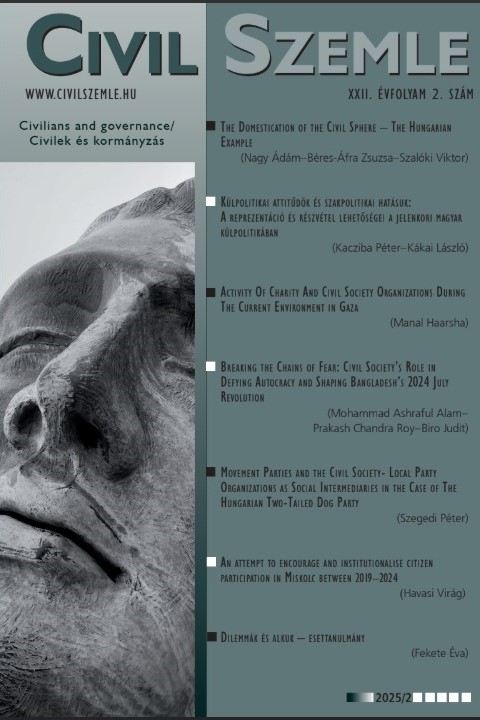An attempt to encourage and institutionalize citizen participation in Miskolc between 2019–2024
Abstract
The study presents the process that took place in Miskolc between 2019 and 2024, during which the municipality aimed to establish and deepen the culture of social participation in the city. To this end, the Office of Social Participation was created under the leadership of the referee responsible for civil participation. The concept of citizens' participation was developed in consultation with members of civil society, which the General Assembly unanimously endorsed. Subsequently, several participation methods were tested. Some of these latter innovations were integral to democratic processes, including citizens' assemblies, participatory budgeting, and city hall meetings. In contrast, other traditional means of participation included citizens' forums and public hearings. However, some methods focused on community development, including community initiatives, community discussions, community surveys, and social hackathons. Other postmodern means of social participation were also applied. Social participation had begun to be integrated into the municipality's operations, primarily thanks to the openness of the chief architect's cabinet, which willingly involved itself in many processes. Cooperation with the Department of City Maintenance and the institution providing cultural services has also started. A local government decree was established regarding the socialization procedure, and a proposal was accepted, according to which the city's tenders should be prepared in the future to involve representatives of civil society organizations concerned by topic and/or location in the planning. Although the creation of a system of civil cooperation was included as a goal in the concept of citizens' participation, it was not possible to initiate its operation. Another weak point of the processes was that very few people were involved in the programs, more than the already active citizens of the city, and even some of the latter deliberately withdrew from the participation process in Miskolc due to conflicts and dissatisfaction. This low participation rate was not unexpected; the experts involved in the process had expected significant effects only in the longer term. However, weak performance regarding communication activities also had a role in this low participation.
References
Boda, Zsolt - Jávor Benedek (2012). Keresem és kínálom: Társadalmi részvétel a környezetpolitikában intézményi nézőpontból. In: Pataki, Gy.–Fabók, V.–Balázs, B. (szerk.). Bölcs laikusok – Környezet, részvétel, demokrácia Magyarországon. Alinea Kiadó és Védegylet, Budapest
Bördős, Éva (szerk.) (2021). Miskolci közösségi gyűlés. Levegőt! Mi szennyezzük, mi szívjuk. Mit tehetünk közösen, hogy jobb legyen a levegőminőség Miskolcon? DemNet
https://kozossegigyules.demnet.hu/wp-content/uploads/2021/06/DemNet-Miskolci-Kozossegi-Gyules-Jelentes-2021.pdf (last accessed: 02/05/2024.)
Csizmadia, Ervin (2014). Miért „alaptalan” a magyar demokrácia? Pártok, konfliktusok, társadalmi kohézió és állampolgári nevelés. Gondolat kiadó, Budapest
Elstub, Stephen., & Escobar, Oliver. (2019). Handbook of democratic innovation and governance. Edward Elgar Publishing. DOI: https://doi.org/10.4337/9781786433862
Füzér, Katalin (2017). A projektesített város. Részvételi városfejlesztés az ezredfordulós Pécsett. IDResearch Kft./Publikon Kiadó, Pécs.
Gosztonyi Márton (2022). Egy részvételi folyamat kezdete- A józsefvárosi részvételi költségvetés első éve. Esély 33(4), 33-55.
Havasi, Virág (2022a). Hatalomnélküliek-e a civilek a magyar illiberális demokráciában?: 2010–2022 főbb történéseinek elemzése. Civil szemle, 19(3), 47-74.
Havasi, Virág (2022b). Civil szervezetek szerepe Miskolc szociális szférájában. In: K. Nagy Emese-Szabó Tóth (szerk.): Útkereső. Kutatások az Észak-Magyarországi régió felemelkedéséért. Miskolci Egyetemi Kiadó, Miskolc,. 64-82
Hartz‐Karp, Janette., & Briand, Michael K. (2009). Institutionalizing deliberative democracy. Journal of Public Affairs, 9(2), 125-141. https://doi.org/10.1002/pa.320
Herman, L. E. (2015). Reevaluating the Post-Communist Success Story: Party Elite Loyalty, Citizen Mobilization, and the Erosion of Hungarian Democracy. European Political Science Review, 8(2), 251-284. https://doi.org/10.1017/s1755773914000472
Jávor, Benedek - Beke Zsolt, Frigyes (2012). Résztvevők és apatikusak. Adalékok a társadalmi részvétel helyzetéhez. Politikatudományi Szemle. 22(4), 59-88.
Illéssy, Miklós- T. Nagy, Judit- Számadó Róza (2019). 21. századi önkormányzati sikertényezők vizsgálata az ÖFFK II. projekt kutatásainak tükrében. Belügyminisztérium Önkormányzati Koordinációs Iroda, Budapest, ISBN 978-963-9208-57-5
https://real.mtak.hu/110256/2/23523523.pdf
Kocsis, János Balázs (2019). Lakosság bevonásának gyakorlata hazai önkormányzatokban. In Belügyminisztérium, Önkormányzati Koordinációs Iroda (szerk.): A helyi önkormányzatok fejlődési perspektívái Közép-Kelet-Európában: Közös tanulás és innovációk. Budapest, Belügyminisztérium Önkormányzati Koordinációs Iroda, 116–131.
Kocsis, János Balázs – Csanádi, Gábor (2018). Kutatási jelentés- Helyi településfókuszú közszolgáltatások inkluzív faktorainak azonosítását célzó kutatás. https://unipub.lib.uni-corvinus.hu/10284/1/Kutatasi_jelentes_Kocsis_Csanadi.pdf (las accessed: 22/08/2024)
Merényi, M. Miklós (2020). A részvételi költségvetés esélyei a magyar önkormányzatokban. Friedrich-Ebert-Stiftung, Budapest Megújuló Magyarországért Alapítvány, Budapest.
K-Monitor Közhasznú Egyesület - Miskolc mjv (2021). Melléklet a Közgyűlés 475=2021(XII.16.) határozatához. Miskolc mjv állampolgári részvételi koncepció.
Nárai, Márta-Reisinger, Adrienn (2016). Társadalmi felelősségvállalás és részvétel-a lokális és területi közösségi folyamatokban. Dialóg Campus Kiadó, Budapest-Pécs.
Newton, Kenneth (2012). In Geisel, Brigitte, and Newton, Kenneth (eds.): Evaluating Democratic Innovations - Curing the Democratic Malaise? Routledge, New York, 3-20.
Oross, Dániel (2020). Versengő demokráciafelfogások, új részvételi lehetőségek? Képviselet, részvétel, deliberáció és demokratikus innovációk. Politikatudományi szemle (4), 105-120.
Oross, Dániel – Kiss, Alexandra (2022). Demokratikus innovációk a magyar pártok választási programjaiban. Politikatudományi szemle, 31(2), 7-28.
Pataki, György (2007). Bölcs „laikusok”. Társadalmi részvételi technikák a demokrácia szolgálatában. Civil Szemle, 1(3-4), 144-156.
Sintomer, Yves-Herzberg, Carsten - Röcke, Anja. (2008). Participatory budgeting in Europe: Potentials and challenges. International Journal of Urban and Regional Research, 32(1), 164-178. https://doi.org/10.1111/j.1468-2427.2008.00777.x
Szántó, Richárd (2012). Társadalmi részvétel Magyarországon. Siker vagy kudarc? Kovász, 16(1–4):33–53.
Tarrow, Sidney G. (2011). Power in Movement.Socialmovements and Contentious politics. Cambridge: Cambridge University Press.



